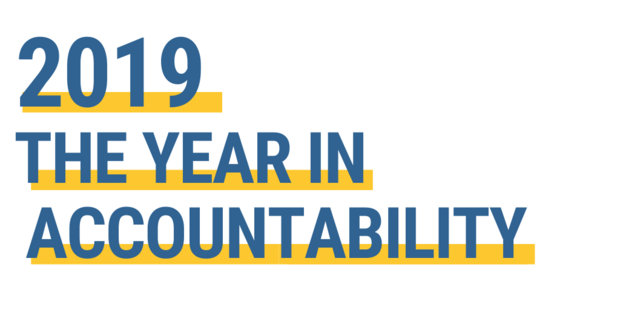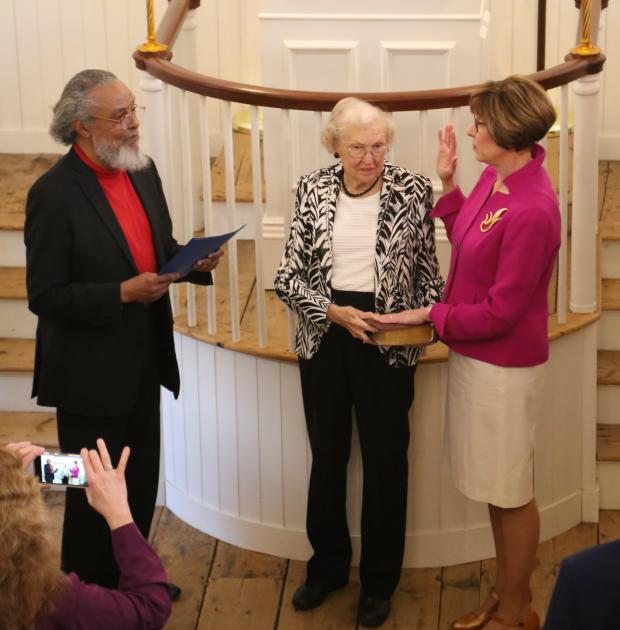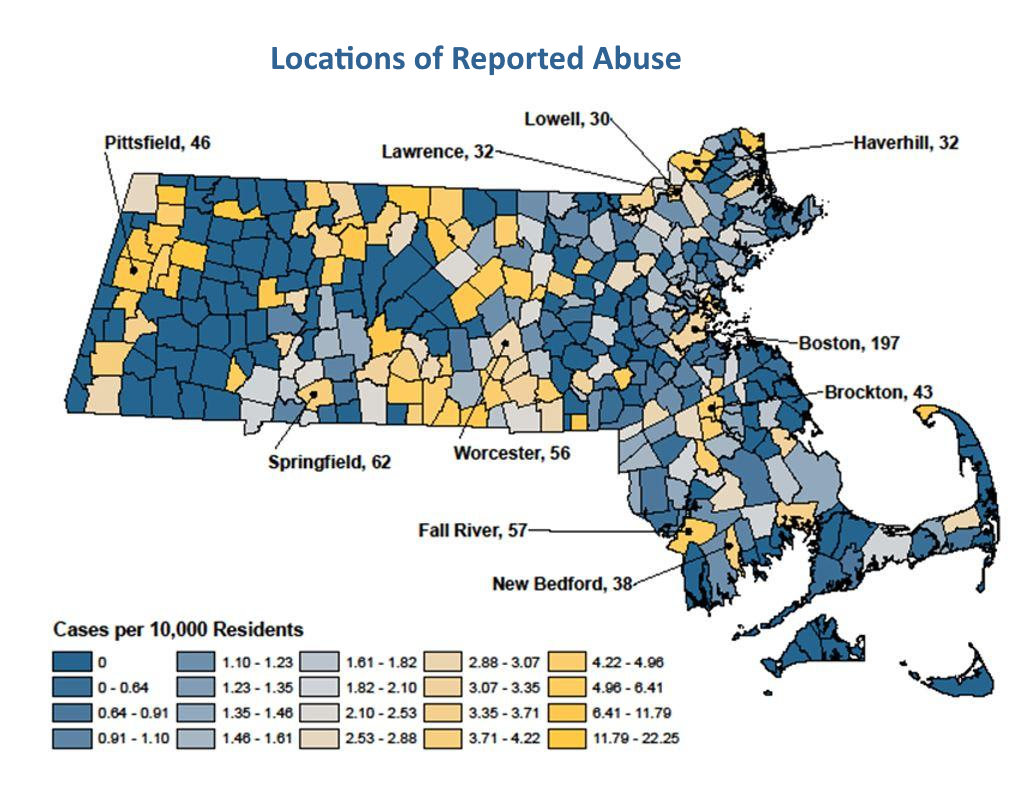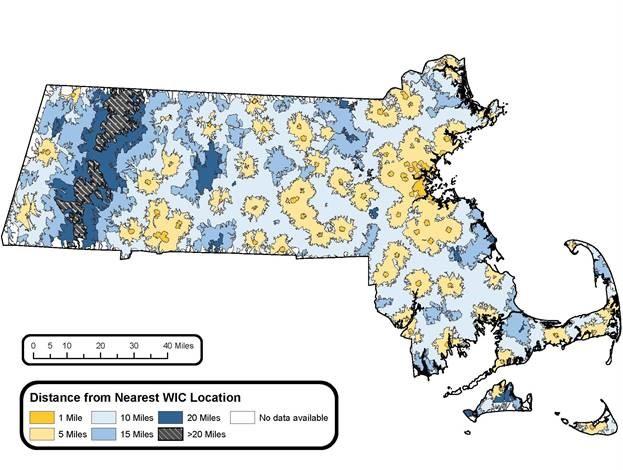A New Beginning
As she took the oath-of-office for the third time, State Auditor Suzanne M. Bump set the tone for the impact she and her staff would make over the coming year. Bump was sworn-in for the new term by former Representative Byron Rushing in the chapel of the African Meeting House in Boston. In her inaugural remarks, Auditor Bump highlighted the importance of accountability in building public trust in government, challenging state agencies to break down the silos that prevent them from adequately serving the residents of the Commonwealth, and developing new solutions to lingering problems.
“"The imperative that our work advance the interests of the Commonwealth means that we identify not just improper payments, waste, and fraud in state government, but also that we address the root causes of system failures, identify barriers of access to state services, and assist agency efforts to meet the needs of their constituencies effectively and efficiently," Auditor Suzanne M. Bump at her inauguration ceremony, January 16, 2019.
”
Additional Resources
Protecting Children & Families
More than any other area, the Office of the State Auditor has rigorously and consistently scrutinized the work of agencies tasked with keeping vulnerable children and families safe. Since 2011, the office has conducted numerous audits that have led to significant improvements in this realm.
Video: WCVB: Auditor says DCF needs to do more
Skip this video WCVB: Auditor says DCF needs to do more.In May, the OSA released an audit of the Office of the Child Advocate (OCA). This important office is tasked with acting as an independent voice for children and families in the Commonwealth and highlighting areas where the state can better serve this population. While the audit found no problems with OCA's operations, it noted that under current policies, the agency only received information about approximately two percent of allegations of sexual abuse of children. This is because the Department of Children & Families (DCF) is only required to report to OCA substantiated incidents of abuse or neglect that take place in institutional settings, such as licensed preschools and daycares, foster care environments, group homes, residential treatment programs, elementary and secondary schools, and youth correctional facilities. However, similar incidents of abuse against children in non-institutional settings, such as those that occur in a home with a biological parent or legal guardian, are not subject to the same reporting requirements.
Auditor Bump called on OCA to work with DCF to expand the reporting requirement to alleged incidents in non-institutional settings. This would allow OCA to more effectively advocate for all children in the Commonwealth who receive services from state agencies.
The OSA continued its advocacy for vulnerable children and families in an audit of the Department of Housing and Community Development (DHCD) that was released in August. This audit found DHCD did not inform women and families in its Emergency Housing Assistance (EA) program of registered sex offenders living at shelter sites. The EA program provides shelter to women and families who are homeless and helps them find stable, permanent housing. Auditor Bump called on the agency to use the Commonwealth’s Sex Offender Registry to identify offenders who may be living or working near shelter sites and take appropriate measures to ensure the safety of program participants.
Additional Resources
Improving Police Training
Massachusetts has one of the highest hourly requirements for in-service police training in the nation, at 40 hours of in-service training annually. However, a study released by our office in November notes that due to a lack of funding and limited training resources, the state does not provide enough opportunities to allow officers to meet this requirement and has no mechanism to hold officers and municipalities accountable for meeting it.
Video: Auditor Bump discusses municipal police training on On The Record
Skip this video Auditor Bump discusses municipal police training on On The Record.In the report, Auditor Bump lays out a series of steps to bolster in-service municipal police training in the Commonwealth. Of particular note is the need for increased funding for the Municipal Police Training Commission (MPTC). The state recently passed a $2 surcharge on rental vehicles. Bump estimates this surcharge could add as much as $6.2 million to the budget for in-service municipal police training in Massachusetts--a significant increase, but still far short of what is required to meet all the training needs.
Auditor Bump calls on the Legislature to use the new revenues from the rental car surcharge to supplement the existing annual budgetary line item for the MPTC.
In the report, Bump also calls on the state to:
- Establish a Police Officer Standards & Training (POST) system to set standards for maintenance of police licensure or certification;
- Improve guidance to municipal police departments as to how to fulfill their responsibilities regarding in-service police training; and
- Create a long-term strategic plan to address instructional and facility deficiencies and submit annual reports to the Legislature to promote accountability and to justify the increases in additional funding resources.
Additional Resources
Making MassHealth Efficient & Accountable
MassHealth is by far the largest state government program in the Commonwealth. In fiscal year 2017, MassHealth paid more than $15.3 billion to healthcare providers. MassHealth spending represented approximately 39 percent of the Commonwealth’s total fiscal year 2017 budget.
Due to the size and complexity of MassHealth, the OSA has an audit unit dedicated to auditing this important program. In 2019, the OSA released nine audits examining topics related to MassHealth.
An audit examining MassHealth policies and procedures related to services for members receiving medication-assisted treatment (MAT) for opioid use disorder (OUD) highlighted need for expanded access to counseling for these individuals. Auditors found that, due to a shortage of available counselors, a lack of bilingual and multilingual counselors, low reimbursement rates, and few counselors with proper OUD specialized training, approximately 27 percent of MassHealth members treated for OUD did not receive or may not have had access to recommended counseling.
The audit also showed that some MassHealth members received OUD counseling from health care professionals who were not certified in addiction treatment.
In August, the OSA released an audit that found nearly $1 million in improper payments by MassHealth for prescription drugs. It showed the program paid for unauthorized prescription refills, improperly paid for refills of emergency drug fills, and sometimes paid for over-the-counter drugs for members in institutional settings.
The OSA also examined claims submitted by several providers for optometry, adult day health and day habitation services, and MassHealth's administration of its accounts receivable.
Additional Resources
- MassHealth Audits
- Audit Calls for Improved Documentation Practices at Dracut Adult Day Care Provider
- Audit Calls for Improvements to MassHealth Billing Practices of United Cerebral Palsy of MetroBoston
- Audit Leads to Improvement to MassHealth’s Accounts Receivable Process
- Auditor Bump Calls on Carlisle Optometrist to Repay Over $300,000 to MassHealth
- Audit Finds Nearly $1 Million in Improper Payments by MassHealth for Prescription Drugs
- Audit Calls for Improvements at Norwood Adult Day Health Center
- Audit Highlights Need for Improved Access to Opioid Counseling and Expanded Prescriber Training
- Audits Call for Improvements at Plymouth & Hopkinton Adult Day Health Providers
Preventing Cyberattacks
Recognizing that government agencies increasingly rely on information technology (IT) resources to deliver services, State Auditor Suzanne M. Bump has worked to confront the cybersecurity challenges government agencies face. In 2019, our office has helped strengthen IT operations across state government and has helped better protect the Commonwealth’s residents from cyberfraud.
Video: Auditor Bump discusses her audit of the Department of Revenue on On The Record
Skip this video Auditor Bump discusses her audit of the Department of Revenue on On The Record.An audit of the Department of Revenue (DOR), which was released in December, cautioned inadequate controls at the agency could make sensitive taxpayer data, including Social Security numbers and tax payment history, vulnerable to cyberattacks and inappropriate disclosure. The audit found DOR was not prepared to respond to or mitigate cyberattacks it, or its vendors, face. DOR also did not have procedures in place to guide its response to IT security incidents. Without developing, documenting, and testing these procedures, DOR likely will not be prepared to quickly respond to security incidents when they occur, which could lead to additional lost or compromised data. Additionally, it had not fully assessed the IT vulnerabilities facing third-party vendors that have access to personally identifiable information (PII), such as Social Security numbers. The failure to develop these plans and assess these risks increases the likelihood that sensitive data could be inappropriately accessed.
Similarly, an audit of the Executive Office of Education, released in October, found the organization was not holding its third-party vendors to security standards established by the state.
“"The state can't wait to act until there is a major data breach. The time to act is now, before a major event affects the lives of thousands of state residents." - Eagle-Tribune editorial, December 18, 2019”
Additional Resources
Keeping Elections Accessible & Affordable
Our democracy is strengthened when we all show up, stand up, and speak up. The state's early voting law makes it easier for residents to make their voices heard in our elections. Since it was passed, one out of every five voters in the state has taken advantage of the convenience it offers. However, when the early voting law was passed, it imposed an unfunded mandate on cities and towns in the Commonwealth.
In 2019, Auditor Bump has continued to work to address this unfunded mandate. Working with the legislature, she has helped to return over $2 million dollars to communities to cover their costs to provide early voting in the 2016 and 2018 elections.
However, the state owes it to cities and towns to permanently address this unfunded mandate. In doing so, we need not re-invent the wheel, since there is already a working model for funding expanded access to the polls, one that has existed since 1984.
That was the first year that all cities and towns were required to institute uniform polling hours of 7 a.m. to 8 p.m. Recognizing this law would create an unfunded mandate on municipalities, the Legislature included language directing the state auditor’s office to certify the additional expenses placed upon communities to provide these extended polling hours. Since 1984, the OSA has certified, and communities have been compensated for, over $30 million to meet the requirements of this law.
Auditor Bump worked with Rep. Steven Ultrino to bring forward legislation that will mirror this process to address the early voting unfunded mandate. Under the bill, when Bump's office determines the expenses communities face to comply with the Uniform Polling Hours Law, it would also certify their costs to comply with the Early Voting Law. After they certify these costs, the Secretary of the Commonwealth will allocate funds to communities to provide both of these services before the elections take place.
“"With the 2020 election looming, now is the time to address this unfunded mandate once-and-for-all. We owe it to the residents and communities of Massachusetts to make voting as easy and accessible as possible. We also owe it to local officials to provide a predictable and easy process." - Auditor Bump in an op-ed in Commonwealth Magazine, October 26, 2019. ”
Additional Resources
- Read the bill from Auditor Bump & Rep. Ultrino to address the early voting unfunded mandate
- Auditor: State needs to cover cost of early voting - Commonwealth Magazine
- Massachusetts Communities to be Reimbursed Over $1.1 million for 2018 Mandated Early Voting Expenses
- See how much your community has received as a result of the Uniform Polling Hours certifications from the OSA
Safeguarding Seniors
Video: WWLP: State calling on Dept. of Public Health to enhance oversight of nursing home neglect
Skip this video WWLP: State calling on Dept. of Public Health to enhance oversight of nursing home neglect.Senior citizens are among the most vulnerable residents in the Commonwealth. This is why they are a frequent target of abuse, neglect, of financial exploitation. In 2019, the OSA continued its efforts to ensure the programs and providers tasked with protecting elderly residents in the Commonwealth are working effectively.
However, a September audit found the Department of Public Health’s (DPH) Division of Health Care Facility Licensure and Certification (DHCFLC), the unit responsible for monitoring state health care facilities, did not prioritize and conduct investigations of cases of mistreatment within required timeframes. The audit found problems with the timeliness of DPH’s process for both prioritizing and investigating allegations of abuse, neglect, mistreatment, or misappropriation of patient funds or property that were deemed a high priority. The audit also found the agency did not always properly report allegations of abuse to local district attorneys. These failures could result in prolonged physical and financial harm to residents.
Similarly, an audit of the Greater Springfield Senior Services, Inc. (GSSSI) found the agency did not always properly investigate, document, or report serious incidents of abuse or neglect of seniors. GSSSI’s Protective Services Unit is one of twenty protective service agencies (PSAs) across the Commonwealth that is designated by the Executive Office of Elder Affairs (EOEA) to help investigate reports of elder abuse.
In response to the audit, GSSSI indicated it is taking steps to augment staff training, establish improved monitoring processes, and hire additional staff to analyze agency activities and identify problems. Additionally, there have been recent leadership changes at the agency and new management has indicated it will act to remedy some of these problems.
In a 2018 audit of EOEA, Bump’s office found similar issues related to reporting and documentation of elder abuse.
Additional Resources
Strengthening Public Benefit Programs
Video: Qualifying families not taking advantage of WIC benefits, audit says
Skip this video Qualifying families not taking advantage of WIC benefits, audit says.The Office of the State Auditor frequently scrutinizes public benefit programs that provide assistance to low-income people, children, seniors, and people with disabilities. Through their work, they have two primary goals:
- Ensure benefits reach those for whom they are intended; and
- Ensure benefits are not fraudulently obtained by people who do not qualify for them.
In September of this year, Auditor Bump released an audit examining barriers people face when seeking to access benefits through the Special Supplemental Nutrition Program for Women, Infants, and Children (WIC) program. The audit found barriers related to transportation, outreach efforts of the Department of Public Health, and language and immigration status.
That same month, Auditor Bump hosted a roundtable discussion in Holyoke with WIC program participants. They told her stories of long bus trips to multiple government offices while trying to access benefits through the WIC program. Their comments echoed the audit finding that transportation is by far the biggest barrier individuals face when seeking these services.
At the same time Bump's office worked to reduce these barriers for individuals who qualify for benefits, the OSA's Bureau of Special Investigations (BSI) continued their work to root out fraud in public benefit programs, such as MassHealth and SNAP.
MassHealth allows members with permanent or chronic disabilities to hire PCAs to help them with personal care and other activities of daily living. Through this program, MassHealth provides the member with funds to hire the attendant and act as their employee. The MassHealth member is responsible for hiring, scheduling, training, and if necessary, firing the PCA.
The annual report from BSI shows that the number of incidents of MassHealth PCA fraud identified by Bump’s office has more than doubled over the past three years, growing from 147 cases in 2016, to 300 cases in 2018, resulting in $1,379,493.93 of fraud. Recognizing the frequency of Personal Care Attendant (PCA) fraud in the MassHealth program, Bump announced an increased focus on this area.
Additional Resources
Supporting Students in Foster Care
As a Commonwealth, we have a responsibility to ensure every student in the state has the opportunity to reach their full educational potential. However, students in foster care often face unique challenges.
A report released by the OSA in April highlights issues that strain the current system for providing educational services to these students and threaten their academic success. These include communication and cooperation roadblocks between child welfare and local education staff, confusion caused by federal law, a shortage of transportation resources, increasing demand, and a disproportional impact on resource-constrained communities.
To address these transportation challenges, Bump calls for:
- The Commonwealth to cover the full cost of educating children in foster care and transporting them to the classroom;
- The Department of Children and Families (DCF) and the Department of Elementary and Secondary Education (DESE) to collaborate to provide staff training on making placement decisions in the best interests of children;
- Maintenance of a dynamic list of students in foster care and relevant information related to their school placement;
- Implementation of electronic backpacks for students in foster care to ensure schools promptly receive information about the educational needs of incoming students. These electronic backpacks would contain important information about the student’s educational record and needs; and
- An improved process for recognizing the past academic achievement of students in foster care who have frequently changed schools, similar to efforts implemented to support children in military and agricultural families.
“"We have to get this right. If we do not provide these students with a strong academic foundation, it is not only a failure of governance, it is a moral failure of government." - Auditor Suzanne M. Bump to the Massachusetts School Committee and Massachusetts School Superintendents "Day on the Hill"”
Additional Resources
- Auditor Bump Calls for Improvements to State’s System Providing Educational Services to Children in Foster Care
- Auditor Suzanne Bump Speaks at the Massachusetts School Committee and Massachusetts School Superintendents "Day on the Hill"
- Auditor: Mass. should pay for foster kids’ education - Boston Globe
Helping Consumers, Workers, and Small Businesses
When most people think of the work of the OSA, they see it as largely impacting the operations of state agencies, policies, and procedures. However, in 2019, many of the audits conducted by the office had direct impacts on consumers, workers, and businesses.
A January audit of the Division of Standards (DOS) found that the agency's failure to regularly inspect consumer weighing devices, such as gas pumps and grocery scales, could be costing consumers significantly. Under state law, DOS is responsible for performing annual inspections of these devices in towns with 5,000 or fewer residents.
DOS is responsible for inspecting consumer weighing devices in these communities with 5,000 or fewer residents.
The audit found DOS had no inspection records for many towns with fewer than 5,000 residents. Auditors also found instances in which devices were in operation without inspection stickers, devices had inspection stickers but DOS had no record of inspecting them, and devices in operation that had not been tested since 2014.
The OSA also highlighted several areas this year in which government was not meeting its commitment to working men and women in the Commonwealth.
An audit of the Division of Labor Relations found the agency routinely missed deadlines for resolving public employee grievance cases. The audit found that some cases took over 2,500 days to resolve.
It also found DLR did not have any established time standards for case processing and completion for a number of labor case types, including contract mediation, outside grievance mediation, and representation. By not resolving these cases in a timely fashion, DLR could create a backlog of unresolved claims and could subject employees to economic hardships.
Similarly, an audit of the Division of Apprentice Standards (DAS) found the agency was not providing necessary oversight of employer sponsors that participate in the apprentice program. DAS did not perform required reviews of any of state-regulated apprentice programs. This could result in apprentices not receiving the training they need to successfully compete for careers in their fields of study.
Finally, in 2019, the OSA identified areas where the state must improve how it serves businesses. For example, an audit released in June revealed that the Massachusetts Office of Business Development (MOBD) never implemented the Buy Massachusetts Program, which was enacted in 1993 by the Legislature. This program was designed to connect Massachusetts companies and encourage them to purchase needed goods and services from each other, rather than from out-of-state or foreign companies.
Additional Resources
- Audit Calls for Improved Inspections of Gasoline Pumps, Grocery Scales in Small Massachusetts Communities
- Audit Shows Need for More Timely Resolution of Public Employee Labor Disputes
- Poor Oversight Led to Inadequate Quality Assurances in State’s Apprentice Programs, Audit Shows
- Audit Reveals Office of Business Development Never Implemented Buy Massachusetts Program



